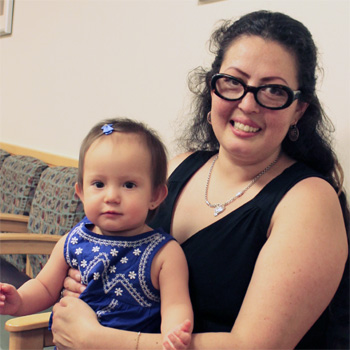Tiny Teeth and Oral Health

Gabriela Robles has benefited greatly from the WIC program at Cambridge Health Alliance.
Gabriela bustled into the WIC office surrounded by her family. She was pushing her 11-month-old baby, Brenda, in a stroller followed by her ten-year old daughter, two nieces and mother-in-law. Everyone was smiling despite the humidity, except for Brenda who was intensely watching the commotion around her. The cousins rushed over to the magnetic game table while Gabriela prepared Brenda for her picture.
"I’m happy to be able to tell people about the WIC Dental Program because I know how important dental health is," explained Gabriela Robles. "When I was a child, my first tooth came in black and I want to make sure my daughter’s teeth are healthy."
There’s a ten-year age gap between Gabriela’s two daughters. She came to the WIC Dental Clinic after her recent move from California. Gabriela wanted refreshers and advice about how to care for Brenda’s new teeth – there are two. "I completely forgot that I wasn’t supposed to let Brenda fall asleep with the bottle," said Gabriela, one of the many tips that she learned at the clinic. She learned about the importance of early dental care and the WIC Dental Clinic from her nutritionist during her first nutrition consultation.
The goal of the WIC Dental Clinic is to change behavior through education, a key part of WIC programming. It is offered free of charge to WIC families with children younger than 5. Once a month, on the first Saturday, Cambridge Health Alliance/Harvard School of Dental Medicine Residents run this educational clinic under the direction of CHA Chief of Oral Health, Dr. Brian Swann. Participants learn important information about dental health for young children and receive a fluoride varnish for their children if they are interested.
"Most people don’t know that dental decay is the most prevalent childhood disease making prevention the most important part of oral health," stated Dr. Swann. "Children with dental decay are self-conscious about their appearance and are often in pain, are not able to chew their food and digest it properly."
There is a direct connection to underperformance in school and other health issues. Because the mouth is used for almost everything, there are 100 diseases that manifest in the oral cavity and a lot of dental disease is transferable from parents to their children, whether through DNA or just bad habits.
"It’s important to help parents understand the connection between oral health and their children’s overall health," added Dr. Swann. "Dental health needs to begin at infancy and even starts with prenatal care. Pregnant women with gum inflammation have a 25 to 30 percent chance of having a pre-term delivery or babies with low birth weight."
While there may not be a lot of dental interventions with babies in their first year, there are behaviors that can start early and lead to much healthier teeth and bodies in adults. It’s also important to recognize that there are cultural nuances regarding oral health that CHA dental providers integrate into their program and discussions.
Here are a few tips that WIC patients learn at the clinic:
- Feeding time is for eating, not sleeping. Don’t give babies a bottle in bed.
- Even breast milk has sugar, so avoid letting babies fall asleep while nursing.
- If giving babies or children fruit juice, dilute it by 75 percent with water.
- Avoid sugary drinks like soda.
- Bring babies in early for a dental checkup (between 6 months -1 year).
WIC is a nutrition program that provides education, healthy food and more. It’s free to income eligible pregnant women and families (dad’s too) with children under five. If you know of anyone who can benefit from WIC, call 617-575-5330.
Disclaimer
This articles provide general information for educational purposes only. The information provided in this article, or through linkages to other sites, is not a substitute for medical or professional care, and you should not use the information in place of a visit, call consultation or the advice of your physician or other healthcare provider.